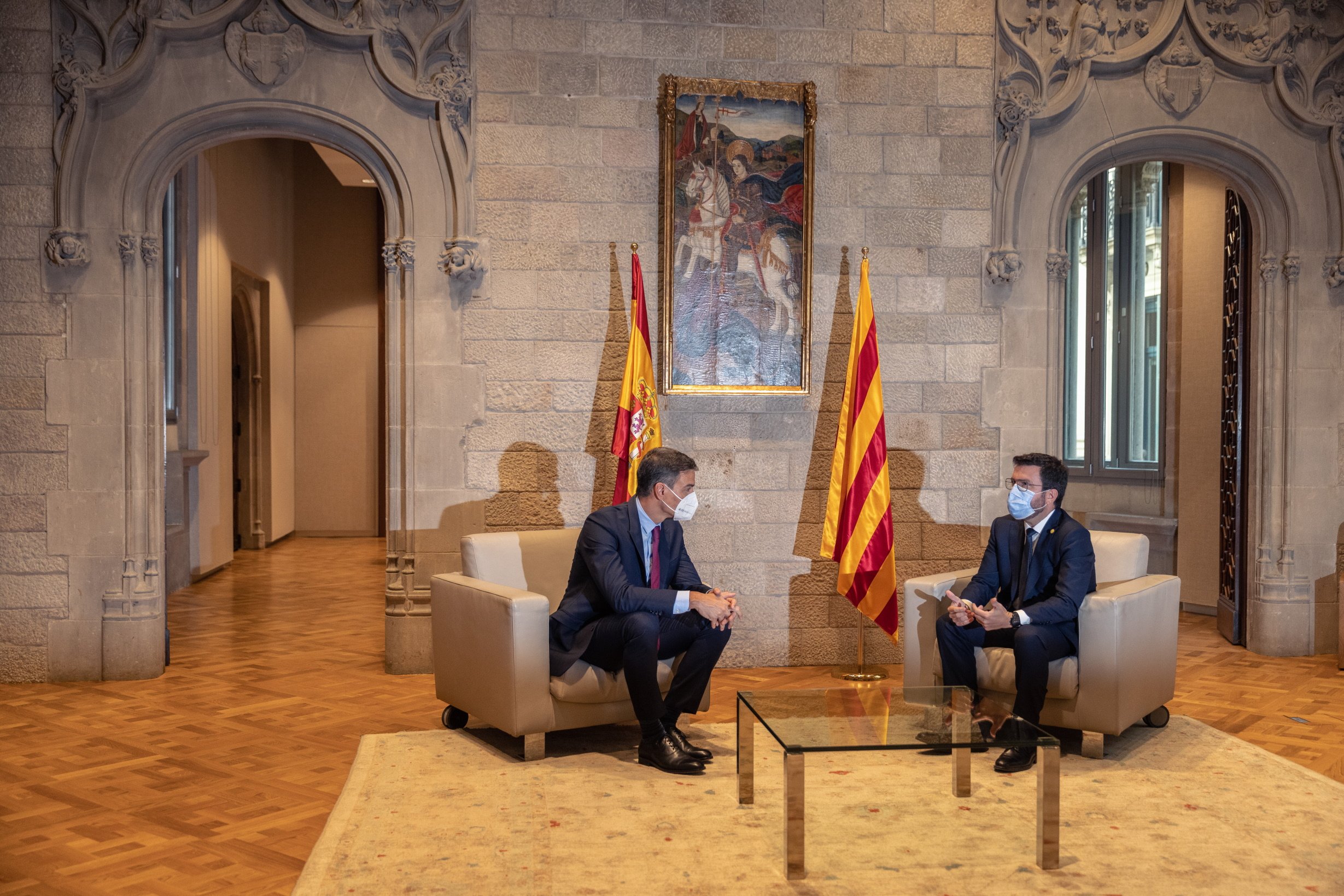The Catalan president, Pere Aragonès, speaking after a meeting of almost two hours with the Spanish prime minister, Pedro Sánchez, made no secret of the enormous differences separating the Spanish state and the Generalitat of Catalonia in the negotiation over the political conflict. However, he defended the "restart" of the talks which was made today with a new session of the dialogue table and warned that it will take "time, perseverance" to start making progress and this will have to happen "beyond very specific deadlines".
Aragonès and Sánchez met in the Generalitat palace's Hall of Deputies at 3pm today in an encounter that lasted longer than expected, while Catalan ministers Laura Vilagrà and Roger Torrent received their four Spanish counterparts, with whom they were to later hold the negotiating meeting.
At the end of the leaders' encounter, Sánchez held a press conference, and was followed by Aragonès. Before Pere Aragonès came to the lecturn, an usher removed the Spanish flag that had been behind the Spanish PM during his appearance.
Periodicity and discretion
Both Sánchez and Aragonès admitted the enormous distance between the two sides and the complexity of this negotiation, but insisted on the desire to construct a more favourable political context and build up trust, in order to try to find a way out of the conflict between Catalonia and the Spanish state. Aragonès called for "methodology, periodicity and discretion".
The allusion to specifics, and to progress rather than deadlines, was not improvised. In fact, the Catalan president repeated it twice, in an implicit reference to the two-year period agreed with pro-independence allies CUP to make progress before they would seek an alternative to the dialogue table.
Role in the negotiation
Although yesterday he was designated by the Catalan cabinet as a member of the Catalan delegation to the table, Aragonès did not speak at the meeting of the dialogue table, because neither did Pedro Sánchez - who at first even refused to take a protocol photo with the negotiators before they took their places. "I will participate in the table on the same terms as the prime minister of the Spanish government," he insisted.
Faced with the Spanish government's intention to address what Sánchez had described minutes previously as his Agenda for the Re-encounter, Aragonés asserted that "the table is tackling a much deeper political conflict, which is not delimited within particular sectoral politics." He also wanted to differentiate this negotiation from the talks on the Spanish government budget, although he admitted that "everything helps". "Obviously it does, but they are different matters. As well as [different] dynamics, here we are two governments and the budgets are being debated in Congress," he argued.
Amnesty and self-determination
Despite Sánchez's deliberate restatement of his rejection of the pro-independence forces' essential demands at the negotiating table, Aragonès reiterated them. The Catalan delegation's proposal, he said, is "amnesty, self-determination, an end to repression and a referendum" and that it will be backed by "very firm stances".
Regarding the absence of Catalan government partner Junts, he explained that he would share the result of the meeting with the vice president, Jordi Puigneró (Junts) and stressed that the plan is to enlarge the Catalan delegation to incorporate further members. For now, however, there were four Spanish representatives facing two Catalan ministers at today's negotiating table meeting.
During the press conference, the president insisted on the need to move towards a democratic resolution of the conflict between Catalonia and the State and stressed that today's table is the response to the call of "Spain, Sit and Talk" that protesters demanded on the streets. "Today's is not a "second meeting", but a resumption of the negotiation process after the inactivity of the pandemic," he insisted.
This dialogue table, agreed between ERC and the PSOE as part of the deal on the formation of Pedro Sánchez's minority government in January 2020, had its only previous meeting in February last year, just before Covid-19 arrived.
Aragonès defended the need for mutual institutional recognition in the face of a conflict of a political nature that requires a democratic dialogue, which, he insisted, must be endorsed by the public. "We have to say, in all honesty, that we are very far apart in our positions, that we face the negotiations noting the difficulties of this type of process, but also that we emphasize the will to get to work, and that the negotiating table is the right tool to make progress to a resolution of the conflict," he said.
In the main image, the Catalan president, Pere Aragonès, during his press conference on the Palau de la Generalitat's Gothic gallery / Sergi Alcàzar

